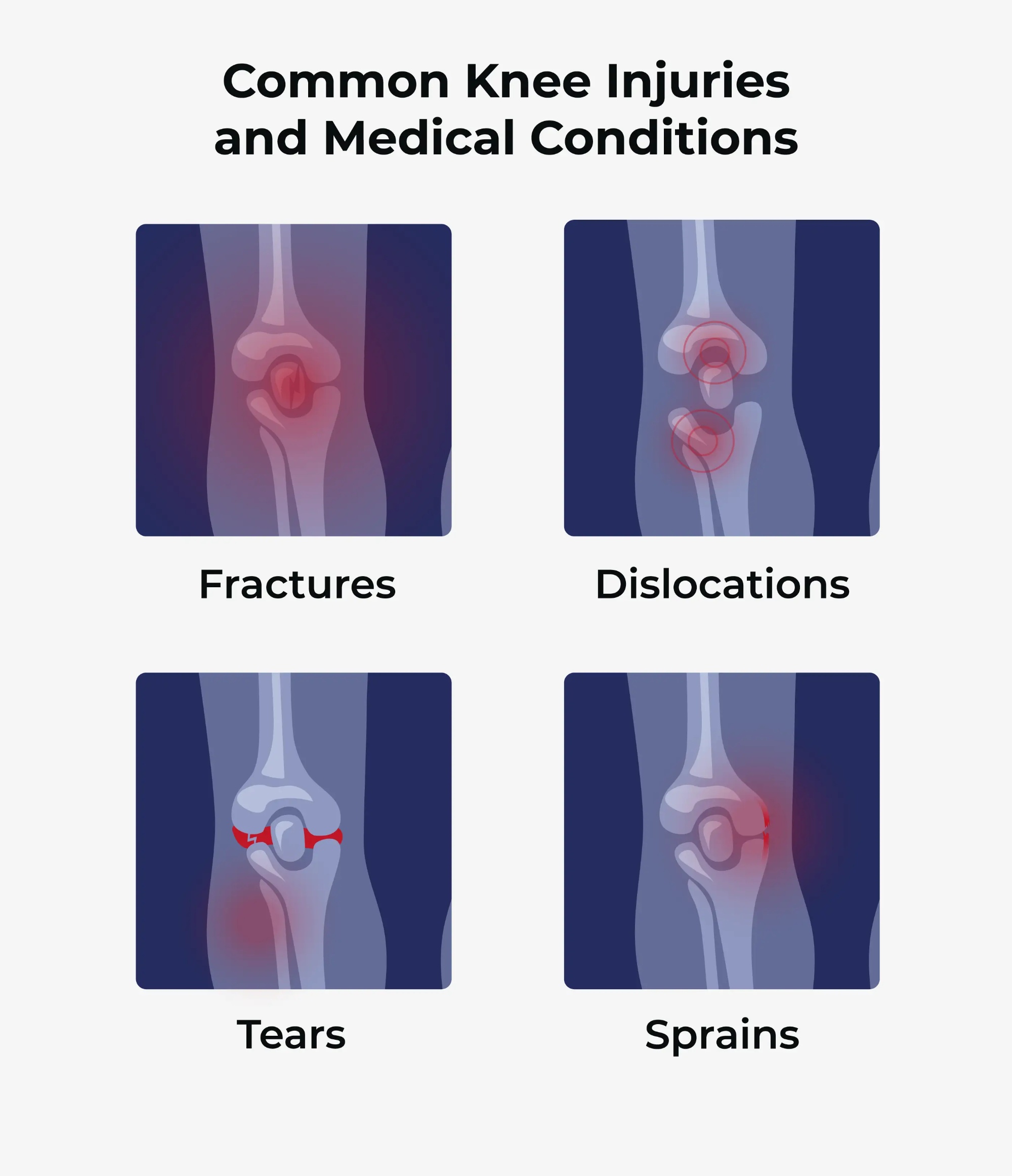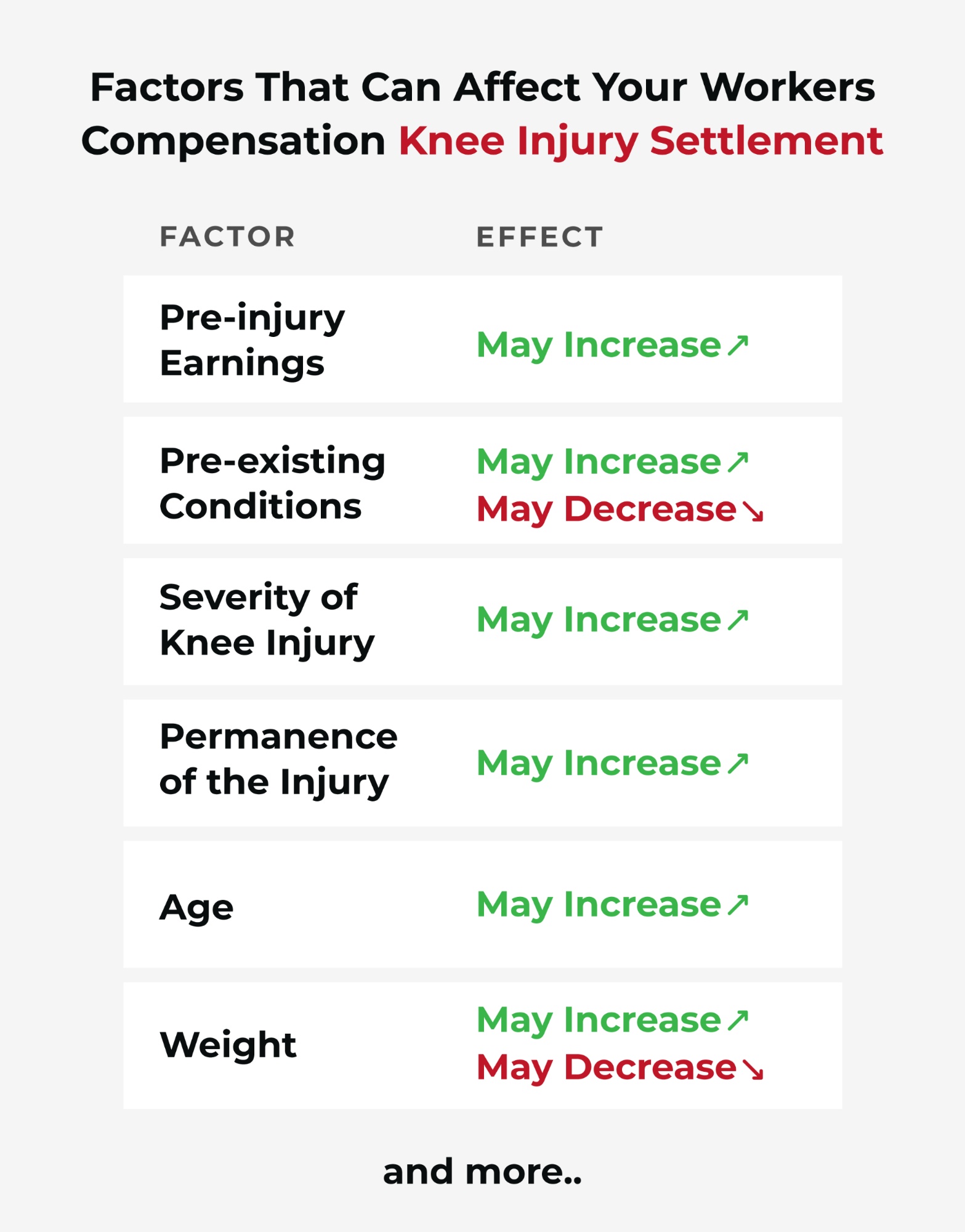Workers Comp Knee Injury Settlement
Overexertion injuries are among the most common workplace injuries in the United States, of which knee injuries make up a significant portion.
Evidence suggests that about one of every eight workplace injuries is a knee injury. The same evidence indicates that workers who experience knee injuries will lose an average of about two weeks from work.
Workplace knee injuries are compensable under Arizona’s system of workers’ compensation. If you have suffered a knee injury at work, call the Matt Fendon Law Group at (800) 229-3880 to set up a free initial workers’ compensation claim consultation with an experienced workers’ compensation attorney.
Who Is Susceptible to Knee Injuries at Work?
Knee injuries do not always come from overexertion. Sometimes you can twist or overextend a knee doing routine office activities. Still, most work-related knee injuries tend to occur throughout a relatively small cluster of occupations, including:
- Construction
- Manufacturing
- Transportation
- Healthcare
Common Knee Injuries and Medical Conditions
Knee injuries can affect you in several ways. Specific types of knee injuries include:
- Dislocations of bones in the knee. A dislocated knee happens when the bones of your knee shift out of place. Knee dislocations usually happen because of a traumatic event, like a car accident or a fall.
- Knee bone (patellar) fractures. Knee bone fractures are serious injuries that can result if you have a traumatic impact on your knee such as a fall or motor vehicle accident.
A knee bone fracture can make it hard or even impossible to straighten the affected knee, or to walk. - Muscle strains. Muscle strains in the knees come from stretching or tearing of muscle fibers. This is often the result of putting too much pressure on the knees while lifting heavy objects.
- Sprains and tears to the anterior cruciate ligament (ACL). The ACL is a knee ligament that lets you move your knee back and forth. An impact to your knee at work can lead to an ACL injury. If this happens, you will probably have difficulty walking, and may not be able to put weight on your affected leg.
- Sprains and tears to the medial collateral ligament (MCL). Your MCL keeps your shin bone in place. You can injure it by putting too much pressure on the outside of your knee. An MCL injury can be a stretched ligament or a partial or complete tear of the ligament. MCL injuries often occur along with an ACL injury.
- Sprains and tears to the posterior cruciate ligament (PCL). The PCL connects your upper leg to the lower leg along the rear (posterior) surface of the knee joint. You can injure it if it is subject to a strong force, like a bent knee hitting a dashboard in a car accident. PCL injuries often happen along with other knee ligament and meniscus damage.
- Osteoarthritis. This is a condition that causes joint swelling, pain, and loss of range of motion. Osteoarthritis in the knee can come from causes other than an on-the-job injury. A work-related accident, or working conditions that cause you to overstrain your knees over time, can worsen a pre-existing osteoarthritis condition. For example, an injury to your knee can lead to a condition known as knee osteonecrosis, a progressive arthritis condition that can require surgery.
- Meniscus tears. The meniscus acts as a shock absorber for your knees. Meniscus tears can happen at work if the knee is twisted, or because of repetitive kneeling, or from rising from a squatting position while lifting.
- Cartilage tears. Cartilage tears can lead to knee pain, knee buckling, and difficulty putting weight on the knee.
- Tendonitis. Tendonitis occurs when a tendon swells after an injury. Tendonitis can cause joint pain and stiffness.
- Bursitis. Bursitis describes an inflammation or irritation of a bursa sac. Bursitis happens often around major joints, including the knee, in cases of overuse.
- Contusion injuries (bruising). Contusions are caused by an impact to the body that damages the surface of the skin and deeper soft tissues.
- Repetitive stress injuries. Repetitive stress injuries to the knees can cause swelling, pain, muscle strain, and tissue damage. Repetitive stress injuries can come from exposure to vibrations, or from compression, or from being held in a fixed position for long periods.

Surgery for ACL injuries has advanced considerably, with arthroscopic surgery available for less serious cases. Open surgery is still used in some cases, though, and it can cost as much as $50,000. Typically, with ACL repair or reconstruction surgery, the anterior cruciate ligament is replaced to regain knee stability.
Many injured employees requiring ACL reconstruction will need six months or more of light-duty work. And some can never return to employment that requires frequent bending, stooping, and twisting. ACL repair or reconstruction ranges from $10,000 to $30,000 or more.
Treatment for Knee Injuries
Depending on the seriousness of the underlying injury, treatment for a workers’ comp knee injury can be as simple as resting the joint, applying a cold compress, and taking some over-the-counter pain medications.
On the other end of the medical treatment spectrum, more serious knee injuries sometimes require surgery and physical therapy.
Here are some examples of knee surgery procedures:
- Meniscectomy: This surgery removes a portion of a torn meniscus. The cost of meniscus surgery can be from $7,500 to more than $12,000.
- Tibial fracture arthroscopic surgery: This surgery can cost from $15,000 to more than $25,000.
- Knee Arthrotomy: This is a form of soft tissue exploratory surgery, used to remove bone fragments from the knee joint or to irrigate the joint. An arthrotomy costs from $5,000 to more than $10,000.
- Kneecap Repair: A kneecap repair surgery to treat a fracture or a displaced patella can cost $15,000 or more.
- Knee Replacement (arthroplasty): This surgery may be needed if you develop severe knee arthritis. A partial or total knee replacement surgery can cost at least $40,000.
Settling a Knee Injury Claim Under Arizona Workers’ Compensation
To qualify for benefits for a workers’ comp knee injury, you will need to meet two requirements: you must be covered by workers’ compensation, and your knee injury must be connected to your employment.
If you are a regular employee of an employer that participates in Arizona workers’ compensation, then you are likely covered by your employer’s workers’ compensation insurance policy.
For your injury to be work-related, it must have either happened at your place of employment or while you were performing your employment duties offsite, like driving an employer-owned motor vehicle.
Factors That Can Affect Your Workers’ Compensation Knee Injury Settlement

Determining how much you can receive in final settlement of a workers’ compensation benefits for a knee injury involves multiple factors. Here are some of the factors our workers’ compensation lawyers at the Fendon Law Group often see:
Your pre-injury earnings. How much your average weekly wage was before the knee injury occurred is the foundational figure for determining how much you can receive in lost wages benefits.
Pre-existing conditions. Having a pre-existing knee condition, like arthritis, is not a bar to receiving workers’ compensation benefits if you can show that because of your work something has happened to make that pre-existing condition worse, like an on-the-job accident or an aggravated condition caused by repetitive motions at work.
The severity of the knee injury. The more serious the injury to your knee, the longer it will probably take for you to recover from it and, consequently, the longer you are likely to need to receive workers’ compensation benefits.
The degree of permanence of the injury. If your knee injury has stabilized into a permanent impairment, you can receive a permanent impairment rating.
How old you are. Generally speaking, as you grow older, the more difficult it becomes for you to find another line of work if your knee injury prevents your from going back to your pre-injury job.
How much you weigh: Your knees can be affected by your weight, especially if you are overweight. If your weight slows your injury recovery, this can lead to a longer injury recovery time, and in some cases can increase your risk of re-injuring the knee.
The chance that you will be forced into different work. If your knee injury is severe enough to prevent you from returning to the work you did before it occurred, then you may have no choice but to accept being assigned to light duty work. If this means that you will lose income from employment, then this is a calculation to include in a workers’ compensation insurance settlement.
The effect of the injury on your mental health. If you suffer a traumatic injury to your knee, then in some circumstances the workplace accident or incident that caused it can also affect your mental well-being.
You might experience post-traumatic stress disorder (PTSD) symptoms, or suffer from depression or anxiety because of the injury and its effects on your work and family life.
The possibility you will need future medical treatment. Knee injuries can be long-term and even permanent. Treatment times can be lengthy, and long-term treatment costs for lab procedures, medical imagery, physical therapy, and even surgeries can add up to $100,000 or more.
Another possibility is that your knee injury will cause you to have to “compensate” by putting more stress on your uninjured knee, which over time can lead to osteoarthritis in that knee.
The amount already paid in benefits. If you have been receiving benefits for lost wages and medical costs, then how much your employer’s insurer has paid can factor into the value of your long-term settlement value.
Whether you are receiving other benefits. If you are receiving benefits for a knee injury, like Social Security benefits, then if you receive Arizona workers’ compensation benefits too these might reduce your eligibility to receive the other benefits.
Is Medicare Review or Approval Necessary? If you are Medicare-eligible or expect to be within thirty months, you need to take precautions when settling. This means including a Workers’ Compensation Medicare Set-Aside Arrangement as part of the settlement amount.
This agreement will state how much of your knee injury settlement you will allocate to your estimated future medical treatment.
Personal injury claims against third parties. If you have a personal injury cause of action against someone for your knee injury, and that person has no connection to your employment, then the workers’ compensation insurance company will likely want to place a lien against what you might receive in a court award or settlement of that claim.
A positive aspect of this for you is that, in return, the insurance company is likely to be more willing to accept your workers’ compensation settlement, because the insurance company will know that it has a likely source of funds from the lien to compensate.
What Is the Average Knee Settlement Amount for a Knee Injury Case?
Knee injuries can be expensive to treat even with workers’ compensation insurance. Your wage loss and medical benefits will be largely determined by the nature and extent of your injuries, as well as how long you are unable to return to work.
Workers’ compensation benefits will cover the cost of reasonable and necessary medical treatment expenses, but they will not cover all of your lost wages if you cannot work.
Other limitations on workers’ compensation settlements are that you cannot sue your employer unless the employer engages in intentional, reckless, or grossly negligent conduct to cause your work-related knee injury.
Also, unlike with a personal injury lawsuit, you cannot receive a remedy for pain and suffering damages in a workers’ compensation knee injury settlement.
According to the National Safety Council, the cost of a workplace knee-injury worker’s compensation average settlement is about $32,000, measured in medical expenses and lost wages.
Knee injury settlements in the United States can be as little as $30,000 for a muscle or ligament injury that does not need surgery to more than $200,000 for injuries that require arthroscopic surgery or a total knee replacement.
Comprehensive Medical Benefits and Knee Injury Lump Sum Settlements
Arizona law allows you to make a lump sum workers’ compensation settlement with the insurance company. Before you do, though, it is important that you carefully identify your estimated future medical expenses and include them in the lump sum settlement.
In settlement discussions, most insurance companies will ask you to waive future medical care as part of a final settlement amount. Be aware that if you go along with this, then you will bear the sole cost of any future medical care you may need for your work-related knee injury.
Disability Wage Settlement Schedules
If you receive a permanent partial disability because of your workplace knee injury, Arizona workers’ comp has a loss-of-use schedule to calculate your permanent disability settlement value.
You can request a scheduled settlement award once you have reached maximum medical improvement for your knee injury, the point where in the opinion of your treating physician you will not get any better with further treatment. Based on this conclusion, your doctor will give you an impairment rating from 10% up to 100%.
Should You Consider Suing Your Employer Instead of Settling?
When we consider all of the settlement negotiation factors above—and that is only a partial list—the decision of whether to accept a workers’ comp benefits settlement offer for a knee injury or to seek more in a personal injury or wrongful death lawsuit is one your Arizona workers’ compensation lawyer can help you to make.
A personal injury lawsuit offers the prospect in some cases of a higher award than the settlement offer amount. This is because in a personal injury lawsuit, you can claim the full value of your lost wages, plus make claims for emotional distress damages and in some cases possibly even punitive damages.
On the other hand, unlike with a workers’ compensation settlement, in a personal injury lawsuit you must prove that your employer was negligent to be able to receive a judgment award. Lawsuits can also take longer to resolve, and in any event the vast majority of personal injury lawsuits settle before trial.
Talk to an Arizona Workers’ Compensation Lawyer Today
At the Matt Fendon Law Group, our highly skilled and compassionate workers’ compensation lawyers are ready to help you with all aspects of your knee injury workers’ compensation case.
We can help you:
- Understand what is happening. The process of obtaining workers’ compensation benefits can be stressful and complicated. It’s critical that you have an experienced Arizona workers’ comp lawyer on your side.
- Deal with your employer. Employers often try to intimidate or take advantage of injured workers. The attorneys at Matt Fendon Law Group will stand up for your rights.
- Negotiate with the insurance company. Insurance carriers are less likely to give you the run-around when you have a skilled and aggressive attorney in your corner.
- Fight for the workers comp benefits you deserve. While you recover from your work injury, workers’ compensation benefits pay a portion of your lost wages, as well as your medical bills. Our attorneys will fight to get you the benefits you need and deserve.
- Represent you at the hearing. A hearing before an administrative law judge could be required. When that is the case, our attorneys will represent you and argue on your behalf.
- Handle your appeal. If your workers’ comp claim is denied, our experienced workers’ compensation lawyers can help you to put together the strongest argument on your behalf within the tight 90-day appeal deadline.
- File a civil lawsuit. If your employer fails to maintain workers’ compensation, litigation may be necessary. A Fendon Law Group workers’ compensation attorney can file a lawsuit on your behalf.
Call us today at (800) 229-3880 to schedule a confidential, free consultation with an experienced workers’ comp lawyer in Phoenix. Or, if you prefer, you can contact us online to ask a question or to schedule a free consultation.
We have offices in Phoenix and other surrounding areas.
Let us show you how we can help you with your Arizona workers’ compensation case. We will provide straightforward advice and help you understand your legal options.




















